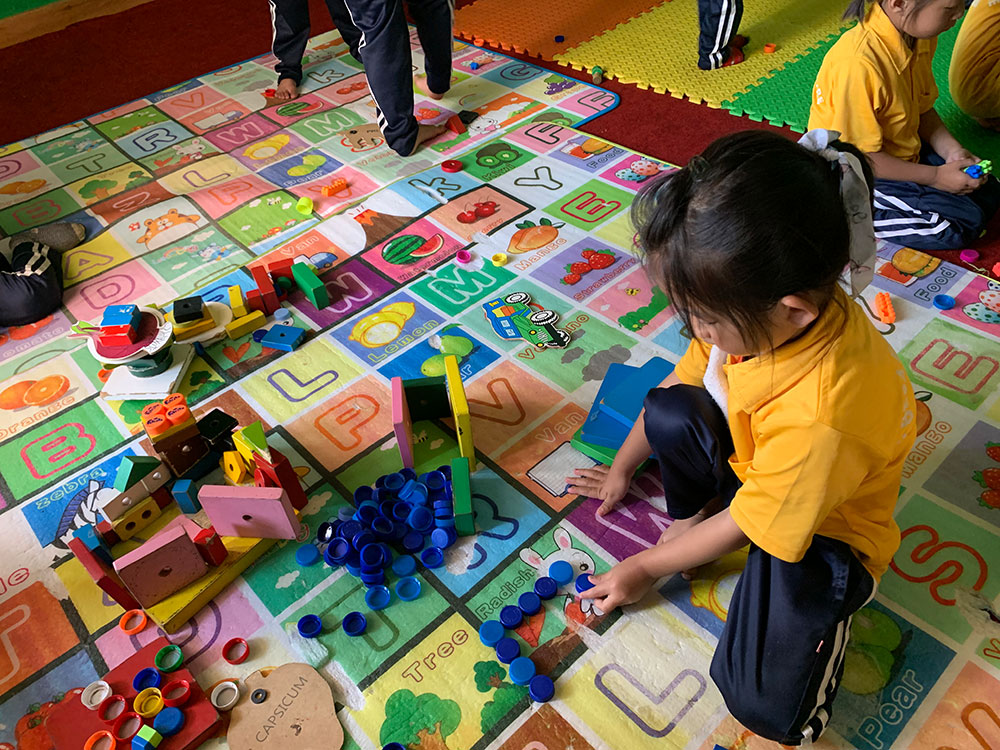Yangyel Lhaden
Despite its delayed opening (by two years) for lack of facilitators, parents who send their children to the government Early Child Care Development centre ( ECCD) at Babesa count it as a blessing.
The ECCD centre for low-income group families has 52 children aged four to six years.
The centre appears deserted from the outside. The playground is covered with overgrown weeds and grasses.
Inside, there are three slides, four seesaws, two balls, two basketball hoops, two four-wheeled toy horses with broken wheels and a few old, colourful blocks. Children mostly play with PET bottle caps, which they have aplenty.
The centre was inaugurated in February 2021. It could not open due to a lack of facilitators. This year, when Centenary Farmers’ Market ECCD is still not operational, the facilitators from CFM are temporarily teaching at the Babesa ECCD centre.
Most children at the centre have never been to an ECCD centre before.
Phul Maya’s second child, a five-year-old daughter goes to the centre. Financial constraints meant she could not enrol her children in ECCD centres before. She is an illiterate sweeper and her husband is a truck driver.
Phul Maya recalls how she used to request neighbours to teach her firstborn. “I am happy my child comes back home and tell me the name of colours and alphabets.”
However, the status of the centre remains uncertain. The three facilitators at the centre have been transferred from the ECCD centre at the Centenary Farmers’ Market when it closed for renovation.
The parents worry about what would happen to their children if these facilitators return to the CFM ECCD centre. “Will they not get a chance to continue going to an ECCD?” another parent said.
A centre should have a child-to-facilitator ratio of 1:15. “There were seven more families in need of the ECCD who we couldn’t refuse,” Babesa Thuemi Dorji Gyeltshen said.
The centre received about 200 applicants that were screened based on four criteria: divorcee parents, single mother, low-income, and children with disabilities.
“This is a temporary measure,” the thuemi said. “We are in constant touch with the Royal Civil Service Commission for facilitators or the possibility for thromde to recruit facilitators.”
The centre has three classrooms and children are divided among the facilitators. The living room is turned into a playroom filled with outdoor toys.
Without an allocated budget, the centre’s toys were moved from the CFM ECCD centre. Parents contributed money and bought mattresses. A parent is appointed as a helper at the centre and paid Nu 6,000 a month by other parents. The parents also take turns bringing fruits for the children.
Facilitators said children initially struggled to interact with each other. Many of them exhibited speech delays, difficulties in pronouncing words, unable to eat on their own, challenges with motor coordination, and were less responsive.
Most parents took their children to workplaces and were confined in small spaces without much freedom to move around.
Phul Maya said her daughter was kept in a room with a phone. “She couldn’t even walk properly.”
Tashi Yangzom, another parent and helper at the centre, said that without friends, her son was constantly confined at home. “He is happy here.”
“The children have found not only friendship but some have even become best friends,” a facilitator said.
A child lines up PET bottle caps and forms a shape. Her best friend remarks, “That’s a triangle”.
“In an urban environment where children have limited opportunities to socialise and are excessively exposed to electronic gadgets, their growth is delayed,” a facilitator said.
Facilitators said that an ECCD centre plays a crucial role in fostering children’s growth, even if they have missed out on earlier opportunities.


